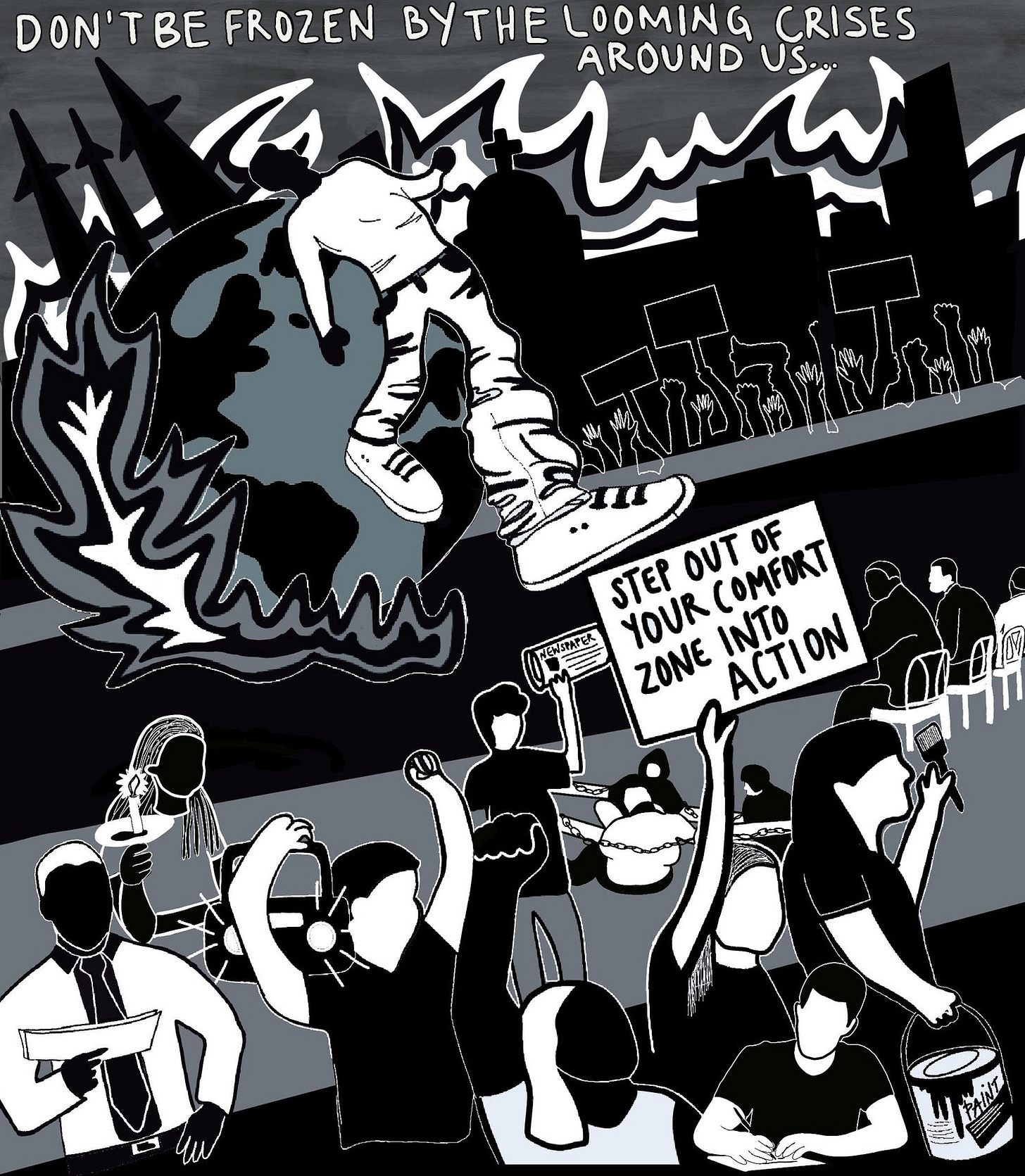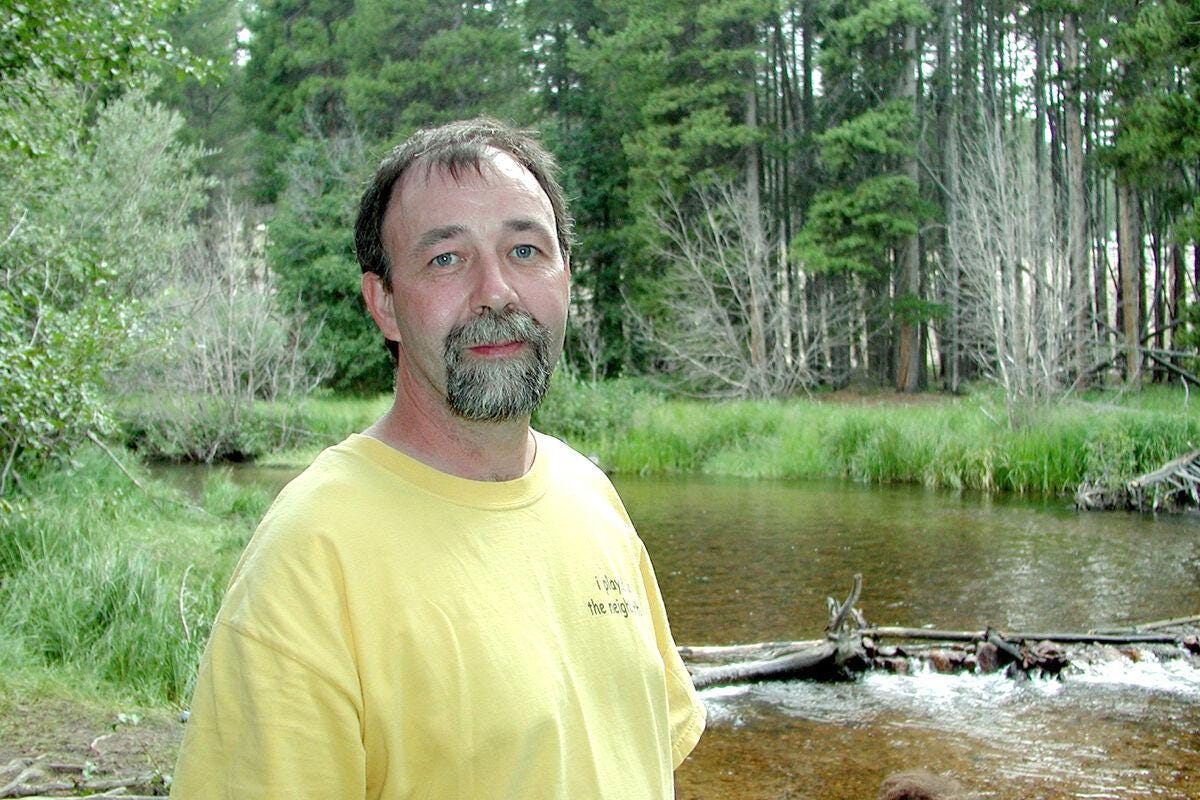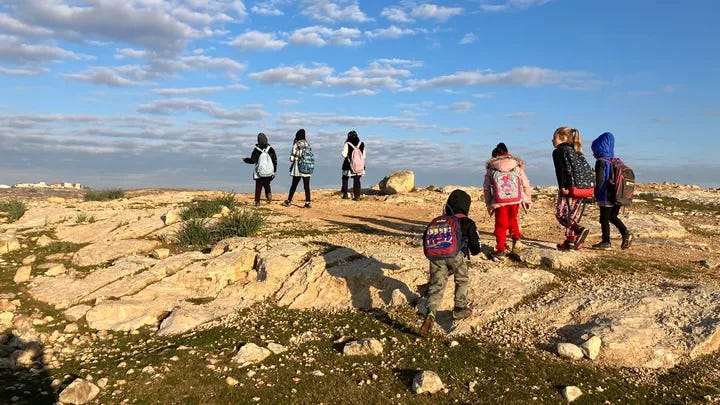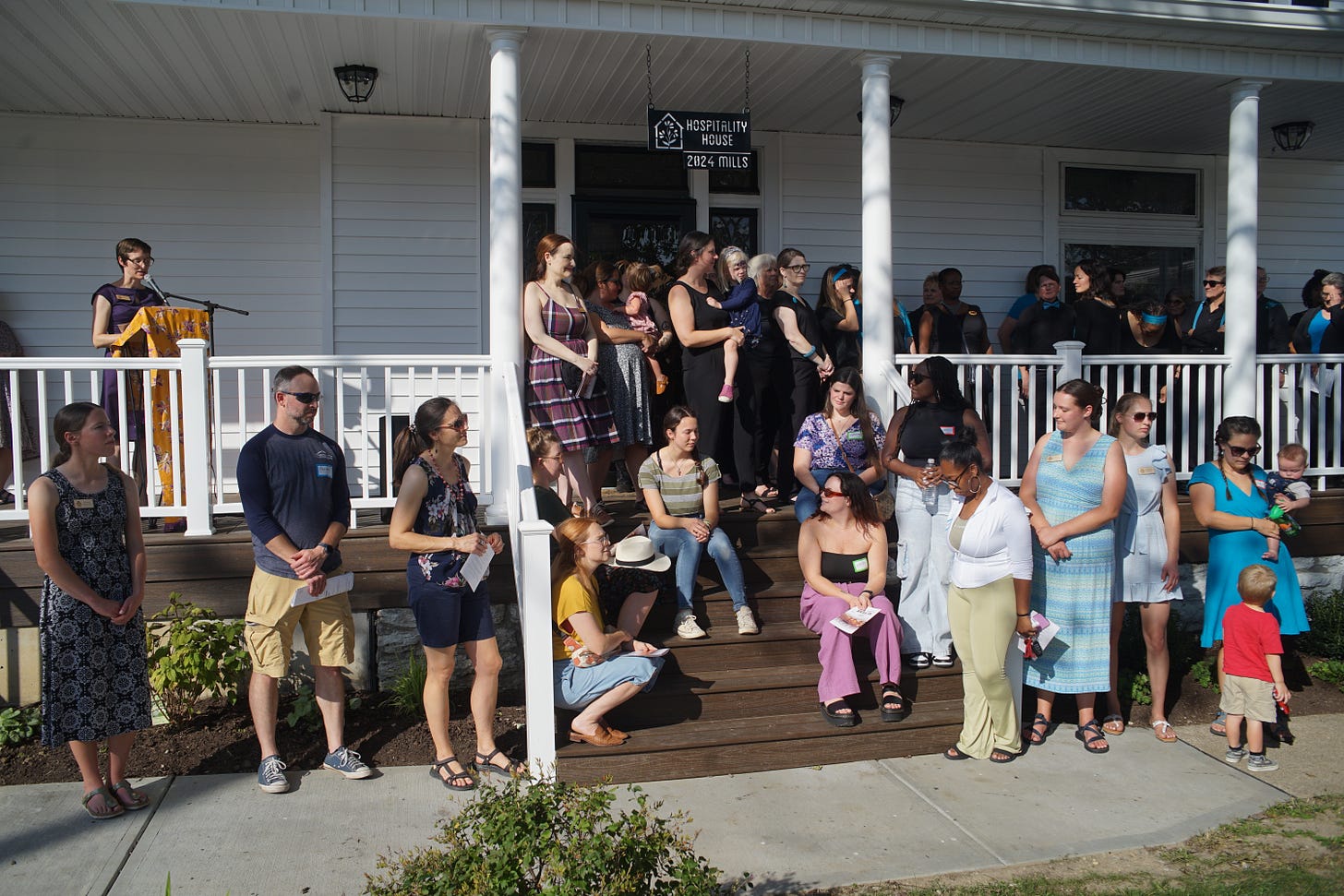Why Catholic Workers Don't Vote (Or Do They?)
Plus: Remembering Michael Sprong; CWer aims to help families of Masafer-Yatta; 25 years of Harriet Tubman House; singing the praises of sweet potatoes; and Peter on politicians.
The Readership Speaks
Some 161 of our 2,750 or so readers participated in our recent reader survey; if that was you, thanks for helping clarify some of our questions. Some fun results:
Fully 20% of respondents live in a Catholic Worker community or have done so in the past. On the other end of the spectrum, 30% of our readers say they’re “just beginning to learn about” the Catholic Worker movement.
20 percent of our readers skipped the calendar section, which is why we’ve cut it. Don’t worry; you can keep up on events at the CatholicWorker.org website (the events calendar is in the dropdown under the News tab).
80% thought the current mix of Featured items to Roundup items was good; 14 percent would like to see more of the shorter Roundup items. Good news: I’ve just managed to export the social media links out of the Catholic Worker directory, which ought to make it easier to find those shorter items for you.
Not surprisingly, only 16% of respondents are definitely interested in connecting online in Substack’s various chat features. CWers are not an online bunch, by and large. Which can be a good thing! You’re out in the garden, or on the soup line, or in jail for civil disobedience!
When we asked what you wanted us to prioritize, 67% wanted to see more original reporting profiling CW communities and activists; 52% wanted to see more essays exploring the theological and philosophical roots of the Catholic Worker; and 46% favored reporting on protests and resistance actions, and 46% also love reading excerpts from Dorothy, Peter, and other “classic” Catholic Workers.
Finally, we are still breaking down the comments you left, but we’ve noticed that a common question is how you can become more involved in the movement. It seems like many of you who don’t live near a community feel disconnected, understandably so. We’d love to explore that question in future issues.
In the meantime, thanks for being here—really. Your courage and compassion and kindness are what make working on this newsletter not only rewarding, but also a real source of hope.
—Jerry
FEATURED
Voting in a Time of Fascism

“I went to jail in Washington, D.C. for women's suffrage in the fall of 1917,
but I have never voted,” Dorothy Day wrote in the late summer of 1980, months before she died. Many (although not all) Catholic Workers today follow her example. In fact, if the only news you ever got came from a Catholic Worker publication, you might very well be completely ignorant of the fact that the United States is preparing for a presidential election in a month.
This disengagement with partisan electoral politics “leads critics and sympathizers alike to roll their eyes and offer us their opinions,” Matt Harper writes in “Voting in a Time of Fascism” in the October issue of the Catholic Agitator, newspaper of the Los Angeles Catholic Worker. As Harper explains,
The reasons for this electoral avoidance are specific to each person, but stem mostly from three interconnected beliefs. Within the United States’ profoundly violent systems, to willingly participate in anything that maintains them betrays the trust God has asked of us, ignores the value system Jesus advocated, and ultimately makes us complicit in the throwing away of vulnerable people. “You cannot serve God and money” (Matthew 6:24).
But as the title of his essay suggests, the current election has complicated things, even for some of the movement’s “faithful anarchists,” Harper writes, including himself. “I find myself awash in questions and conversations about how to understand and respond to the particular challenges of this political moment.” More specifically:
While neither party is a true friend to marginalized communities, do Trump’s overt promises of harm and Project 2025’s calculated destruction mean something worthy of different attention, condemnation, and action? We may not trust either side to fully realize (or honor) their commitments, but do the north poles they take aim at suggest different levels of risk people of conscience should consider in this go-round?
These are just the first of many hard questions Harper examines. While he does not offer any clear-cut answers, in the end, he suggests following your conscience down the path that leads to love for your fellow human beings, especially those who have been discarded by society and forgotten by the political establishment.
You can read his essay at CatholicWorker.org.
Remembering Michael Sprong, Longtime Catholic Worker and Peace Activist
In 1981, 18-year-old Michael Sprong was on his way to California with friends when they abandoned him at the Des Moines Catholic Worker. Getting left behind changed the course of his life, leading to a lifelong involvement in the Catholic Worker and work on behalf of peace and justice.
Sprong passed away on Wednesday after a brief hospitalization, according to an obituary in the Yankton Daily Press & Dakotan.
Besides his time at the Des Moines Catholic Worker, Sprong also lived in Catholic Worker communities in Columbia, Missouri; Omaha, Nebraska; Cedar Rapids, Iowa; and Luck, Wisconsin. He also helped found two communities in South Dakota, including Rose Hill Farm, where he and his partner, Beth, operated a book publishing company focusing on books about the Catholic Worker and peace activism.
A former leader of the South Dakota Peace and Justice Center, Sprong's advocacy work led to significant state policy changes, including Medicaid expansion for children and enhanced indigenous rights protection. His activism extended internationally, serving as an election observer in the Philippines and El Salvador in the early 1990s.
Sprong worked extensively with Nukewatch, an organization focused on nuclear weapons and radioactive waste issues. His most significant anti-nuclear campaign was a three-year project where he collaborated with international law experts to challenge U.S. policies on no-fly zones in Iraq and first-strike nuclear weapon systems.
In June 2000, as part of this broader campaign, Sprong and fellow activist Bonnie Urfer took direct action by cutting down electrical poles that supported a first-strike nuclear communication system. Their goal was to bring international law arguments into U.S. courts. After a multi-day trial that drew attention to nuclear weapons issues, Sprong served 60 days at the federal prison camp in Yankton, South Dakota.
This experience inspired him to become involved in prison ministry and eventually establish Emmaus House to support families of individuals incarcerated at the federal prison. During its 15 years of operation, Emmaus House offered hospitality to over 3,000 women and children.
You can read the full obituary in the Yankton Daily Press & Dakotan and read reminisces by other Catholic Workers at the Catholic Worker Facebook group.
CWer Will Return to West Bank to Help Families in Masafer-Yatta
Cassandra Dixon is returning to Masafer-Yatta in the West Bank in November, hoping to bring relief to the families there. Dixon provides prison hospitality at Mary House Catholic Worker outside the Wisconsin Dells, Wisconsin, and has traveled to Masafer-Yatta every year for fifteen years with Operation Dove, a nonviolent accompaniment organization. She herself was attacked and seriously injured by a settler during her 2023 trip.
Here’s an excerpt from her letter to supporters; you can read the entire letter at the link below:
For 12 months, many of us have been doing all we can to turn back this tide and demand that our country force a ceasefire by refusing to supply weaponry to be used against civilians and aid workers. We’ve written letters and made phone calls and signed petitions. We’ve read and listened and studied and talked to our neighbors and co-workers. We’ve visited state capitals and congressional offices and begged and begged our elected officials to stand up for civilian lives and we are not there yet. We’ve held bake sales and art auctions and every imaginable benefit for emergency aid, only to see Israel block the aid at the border, minutes away from people who are eating animal feed and weeds to stay alive. We have cried every single day for a year, and still the images and suffering that drive us to tears keep coming—and our tax dollars keep funding them.
My brilliant friend Kathy Kelly said recently that we have a right not to kill people. These eight words make more sense to me than any of the thousands and thousands words we have heard and read and written and spoken in the last year. We have a right, as citizens and as civilians, not to fund death and fear and suffering. Not to have taxes drawn from our own labor used to fund Genocide and ethnic cleansing. Not to terrify families in the night in their own homes and drive them from their lands.
So in this dark time, when we absolutely have to find creative nonviolent ways of exercising that right, I believe that spending some time in these villages, with people who are asking the world to come to them, witness their struggle for survival, and help them tell the world before it is too late, is one path to that human right not to kill.
I know that I am perpetually asking for your help, and I am grateful to you for putting up with that and allowing me to share the anguish I feel for the people of Masafer-Yatta. I became connected to these families somewhat randomly, by volunteering in their villages, and being welcomed into their homes and lives, 15 years ago. Now I struggle daily with what my friendship and solidarity should look like in this unbearable time, and I am deeply indebted to you for helping me to keep figuring that out, and for supporting unarmed nonviolent accompaniment.
I hope you will hold these people in your mind in the days and months to come, and not allow their suffering to become invisible.
Dixon is raising funds to help cover the cost of travel and to provide families with blankets, food, cars, schoolbooks, livestock and animal feed destroyed and stolen by settlers. Funds will also pay for medical care for people injured by settler violence. You can contribute to Dixon’s work at her GoFundMe; for other ways to donate, see the links at the bottom of her complete letter at CatholicWorker.org.
U.S. Catholic Bishops Invoke Dorothy During Mental Health Novena
The US Catholic bishops invoked Dorothy Day around the issue of suicide in their recent Novena for Mental Health, held October 10—18. “We hope that this modest Novena will move all people to discern how God is calling them to offer greater assistance to those with mental health needs,” the bishops said in a statement on the web page for the novena. Each day focused on a different mental-health related theme; here is the text for day 8:
Servant of God Dorothy Day (1897-1980, United States) had deep empathy for those who struggle with suicidal thoughts and those who grieve the suicide death of a loved one. She attempted suicide twice as a young woman. In her prayer book, she kept a special list of people who had died by suicide.
Ever loving God, we commend to your mercy all who are contemplating suicide this day. Bring someone or something to intervene.
We pray for our community leaders and officials to come to an understanding of the need for laws, policies, and funding for effective mental health care and suicide prevention programs.
We pray for all who have died by suicide.
May Mother Mary carry them into the loving arms of her son Jesus, asking him to grant them complete joy, without the pain of heart and mind that led to suicide.
Servant of God Dorothy Day, pray for us.
H/t to Casa Maria Catholic Worker’s Facebook post drawing out attention to this item.
THE ROUNDUP
Lydia’s House (Cincinnati, Ohio) celebrated 10 years of operation, plus a new yard, playset, driveway mural, stations of the cross, and atrium. The MUSE Cincinnati Women's Choir provided the music during the program. You can read more about the event and watch a slideshow at the Lydia House website.
Amsterdam’s Harriet Tubman House is celebrating 25 years with a three-part podcast about the community’s history providing shelter to women and children refugees. The podcast, which is in Dutch, is a polished radio documentary. In the first episode, the co-founder of the house, Thera van der Ven, explains its origins and the struggles undocumented people face, such as the inability to open bank accounts or access services without identification. Catch the series at the community’s website.
The Los Angeles Catholic Worker plans to vigil outside the Cathedral of Our Lady of the Angels as part of “Catholics for Palestine” on Sunday, November 3. The vigil aims to “create a prayerful and solemn space to honor all the sacred lives lost in the continuing violence in Gaza, the West Bank, and Lebanon,” according to an announcement on the community’s website, and is motivated in part by “the Archdiocese of Los Angeles’s utter silence in the ongoing genocide against Palestinians.” Find details at the LACW website.
Members of the Des Moines Catholic Worker participated in an overnight vigil Friday night into Saturday morning to mourn the loss of the nine-month-old daughter of a Honduran family staying with the community. Baby Amy died Tuesday night in her sleep. “The family is devastated, as is our community,” DMCW member Frank Cordaro wrote in an email to supporters. The family wishes to return to Honduras as soon as possible; donations for their safe return can be sent to the Des Moines Catholic Worker with a note designating funds for Baby Amy. Contact Frank for details: (515) 490-2490 frank.cordaro@gmail.com.
You may have missed the National Catholic Worker Gathering in Chicago earlier this month, but we’re rounding up quick summaries of what happened at the roundtables there. We have about half of the roundtables covered with summaries from the facilitators; we will add more as they come in. Check it out here.
Faith, love, and nonviolence are powerful tools in resisting the rise of fascism, former Charlottesville Catholic Worker Eric Martin tells U.S. Catholic in an interview about his book, The Writing on the Wall: Signs of Faith Against Fascism (Wipf & Stock). Martin was among a group of people of faith and clergy called Congregate Charlottesville that confronted the “Unite the Right” gathering on August 12, 2017. “I want to be wary of prescribing loving your enemies to other people who are more vulnerable, but for those who are committed to that, I think they should enflesh it, rather than telling vulnerable people to enflesh it,” Martin told writer Cassidy Klein in the interview. “But you go love [your enemies] in a way that doesn’t enable their fascism but shrinks the space for it.” Read the interview at U.S. Catholic.
Ozark Foothills Catholic Worker has been harvesting a wide range of sweet potato varieties: “When we think of sweet potatoes, it usually means a single shade of orange. We typically have just one option at the grocery store. Our industrial food systems push uniformity, and commercial plant breeding prioritizes production over nutrition, biodiversity, and often even taste.” The farm’s harvest has been much more diverse, though: “Some have deep purple flesh and purple skin so dark it is almost black. Others are creamy white and look like a Yukon Gold potato. In between are shades of red, pink, magenta, and tan. The leaves range from nearly entire to deeply lobed. As for taste, we will have to report back after some trials!” Read the full post at Instagram.
The 21st century version of Jesus washing the feet of the disciples might just look like guests helping one another do their makeup, Dani Bodette, a volunteer at the St. Francis House, tells 14 East Magazine: “Sometimes you gotta remember that everyone deserves that type of care and treatment and it’s fun. Fun isn’t just exclusive to people who have homes.” Her comments were part of a longer feature story on the community’s fiftieth anniversary. Read the article at Fourteen East magazine.
“One day as I was welcoming folks into André House for our dinner service, I made eye contact with a woman I had not met before,” Fr. Andrew Fritz writes on the blog of the Congregation of the Holy Cross. “‘Are you the priest here?’ she asked. ‘Yes! Hi, I’m Father Andrew,’ I said. ‘What’s your name?’ ‘Nice to meet you, Father Andrew,’ the woman responded. ‘I’m a child of God. Undercover Angel.’” Read more of his reflection on doing hospitality at Phoenix’s André House of Hospitality: Undercover Angels: Ministry at André House.
Lindsay Myers of St. Louis Catholic Worker participated in a noisy rally outside a weapons conference earlier this week; she was so enthusiastic that she broke the wooden spoon she was using to bang a pot with, according to the community’s Instagram post. Check it out for a short video of the mayhem.
A FEW GOOD WORDS
“Politics Is Politics” by Peter Maurin
1. A politician is an artist
in the art of following the wind
of public opinion.
2. He who follows the wind
of public opinion
does not follow
his own judgement.
3. And he who does not follow
his own judgement
cannot lead people
out of the beaten path.
4. He is like the tail of a dog
that tries to lead the head.
5. When people stand behind their president
and their president
stands behind them
they and their president
go around in a circle
getting nowhere. Roundtable covers the Catholic Worker Movement. This week’s Roundtable was produced by Jerry Windley-Daoust and Renée Roden. Art by Monica Welch at DovetailInk.
Roundtable is an independent publication not associated with the New York Catholic Worker or The Catholic Worker newspaper. Send inquiries to roundtable@catholicworker.org.










I vote but am not enthusiastic about any candidate, but spend more time on the propositions on the ballot. No candidate embraces Catholic moral and social teaching. I ended up voting for Kamala Harris despite her fervent pro-choice stand as well as pushing the LGBTQ “rights” agenda because I believe she would do less damage than Trump. Pretty pathetic reason to vote but I don’t want Trump in the White House again. That would be a disaster.
As for Israel, I totally support people protesting the U.S. supplying weapons to Israel with no strings attached. But I would like to see them protesting at Israeli embassies and at AIPAC gatherings and offices. And I would like to see people protesting at foreign embassies like Russia and other countries which oppress their people as well as having stockpiles of nuclear weapons. I would like to see articles about people showing support to Ukrainians,
Palestinians, and other victims of violence. It just seems too one-sided to only protest our government’s actions.